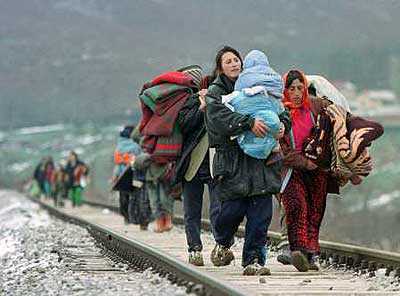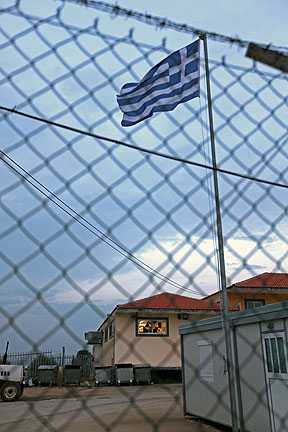
Greece over the past few years has become a source country concerning the entrance of a large number of illegal immigrants, mostly from Asian and African states, who enter mainly through the Greek-Turkish borders. The problem erupted on a full scale in the early 00s and continues with increasing pace.
In 1999, it was reported that 17,000 illegal immigrants were arrested in the region of Evros alone, and the daily output of this illegal industry was calculated at 100,000 euros. Today, it has been estimated by the Greek police that up to 1,000 illegal aliens try to trespass the country each week, and that concerns just the Eastern Aegean island region.
The vast majority of immigrants arrive from Turkey, which is used as a transit point from Asia to Europe as well as a coordinating center for this activity that is under the control of the organized crime networks in that country. The Turkish authorities have announced from time to time that they expel some 100,000 illegal immigrants from their territory each year, while between 1995 and 2005 they managed to expel over 575,000 and arrest 6,100 smugglers.
The same criminal groups that are apt to secure great earnings from the modern slave trade are also involved in the narcotics and arms trafficking, thus presenting the real magnitude of the threat involved in a multifunctional crime-syndicate apparatus in Turkey, one that is also a threat to Greek and European stability. These estimations stream from international bodies such as the United Nationa and the Europol or national authorities such as the UK SOCA and the German BND.
The prices for a “crossing” between the Asian Minor Shore and the Aegean Islands—a few miles apart—costs from $2,000 to $5,000, and for an illegal route from Turkey to northern Europe the smugglers demand up to $20,000.
The immigrants from the African countries travel to Smyrna, Istanbul and Mersina through vessels crossing the Mediterranean Sea, while Arabs come mostly through the Syrian-Turkish borders. The Asians (Pakistani, Bangladeshi, Kurds and Afghani) pass through the Iranian-Turkish borders, and it has to be noted that both countries do not have a visa regime, although Tehran is accused by the world community as a sponsor of terrorism. Therefore the flow of people from Iran to Turkey is in fact unconstrained, and there has not been pressure to Ankara to alter this state of affairs with its neighbor.
Istanbul in particular is the undisputable center where masses of illegal immigrants concentrate before be transported to the West. In the Vefa neighborhood right beside the Süleymaniye Mosque, the Iraqi-Kurdish immigrants gather. In the Laleli area the most immigrants come from the Caucasus. In the Aksaray and the Beyazit Meydani regions there are people from all corners of the Earth pilled in cheap hotels, and in the Tarlabasi sector the African immigrants.
In a city of almost 15 million people, it is roughly estimated that between 250,000 and 500,000 of those are illegally residing, coming from other countries and waiting mainly to find a way towards Europe, mainly through Greece.
The traffickers are able to issue fake visas and passports along with other necessary travel documents, and sometimes they spot potential “clients” in the aforementioned neighborhoods or outside embassies and consulates. They charge up to $15,000 for a passage to the West, depending on demand. That includes mostly transport to Greece or Italy via the sea routes by speedboat or, in most cases, an old vessel. According to Police reports by Greece and other E.U. states, the main exit ports in Turkey are Ayvalik, Ayvacik, Izmir, Kusadasi, Foca, Alacati, Sigacik, Didim, Bodrum, Datca, Marmaris and Bozburuk.
If the client cannot pay the full amount, he is basically sold to his future employer, usually a second-generation immigrant in a European city, where he works until he repays his voyage. Thus London, Paris and Berlin have amassed a considerable number of modern-day slaves who work for almost nothing, long-hours under conditions of extreme stress and insecurity. The present state of turbulence in the Arab-Muslim world will only make things worse, since a significant number of people from this region will seek to enter Europe via the same routes.
Upon reaching Turkish territory, the immigrants are literally stashed in old warehouses or decaying apartments and wait for their transfer. In the meantime—a period up to 3 years—they work as underpaid manual workers in the local tourist and industry businesses, thus minimizing labor costs in Turkey. Turkish groups dominate illegal immigration routes and regularly import Asians to Greece. In 2004 it was noted that over a million illegal immigrants are “in transit” from Turkey towards the Western European countries.
In 2007, at least 150 Turkish citizens were arrested for participating in this activity, also associated with document forgery in complicity with Pakistani and Iraqi groups in Greece. Especially in the Athens region, there has been a particular expansion of the reach of the above groups that also run protection rackets within their communities. There was a dramatic rise in arrests within the illegal immigrant population in Greece between 2007 and 2010, resulting in a great number of those being held in correction facilities due to their involvement in petty crime and drug trade.
The combat of illegal immigration is a top priority for the Greek security forces that have managed to repatriate more than 2.2 million people over the past 15 years, truly an impressive figure for a nation of just 11 million citizens in the outermost end of Continental Europe. Gradually, since the collapse of the Iron Curtain in 1989-1991, illegal immigration along with organized crime became an everyday reality in Greece with armed robberies increasing as much as 500 percent and burglaries over 800 percent, along with a flood of narcotics coming from the northern and eastern borders of the country.
Moreover, sex trafficking became a lucrative illegal trade, and in 2009 a police operation codenamed “Vitrin” that resulted in 75 arrests proved the existence of a well-formatted group that earned as much as 50,000 euros per day from the exploitation of the modern-day white slavery. Similar cases are currently being routinely reported, as well as organized kidnappings of Asian immigrants by their compatriots for ransom, or cases of forced labor in the same communities. It is certain that organized crime has a nexus with the above illegal activities, since it is supplied eagerly by human resources desperate to make a living in a foreign land.
Greece and Turkey signed a bilateral agreement concerning organized crime and illegal immigration in 2003, and in 2005, although they have not been practically put into action. Athens accuses the other side that it does not conform at all in the obligations written in the official documents, such as re-acceptance of expelled people from Greece who had left previously the Turkish coastline.
In 2009, Turkish Ministry of Foreign Affairs Ahmet Davutoglu recognized officially that Ankara is hesitant in accepting back illegal aliens entering from its territory in the European Union. Also, due to Turkey’s no-visa regime with Iran, Afghani illegal immigrants find it rather easy venturing through Iran, which has lax controls, up to the Balkans.
The same year,witnessed a record number of 146,337 illegal immigrants coming from Turkey and being arrested at the borders by the Greek authorities. More than 2,200 people were arrested as traffickers, most of them being of Greek, Turkish, Albanian and Bulgarian nationalities. Athens filled several complaints against Turkey of failing to accept back 60,000 people, as it was originally planned, and it was recorded that just 2,206 were eventually repatriated in Turkey.
The result has been the activation of FRONTEX, an E.U. body responsible for border control that stations a multi-European task force and has assisted to an extent in decreasing the levels of the immigration flow from Asia to Europe through Turkey. Nevertheless, the latest dramatic developments in Syria and the instability in the whole of the Middle East and North Africa point out that surely a new movement of immigrants should be expected by late summer 2011. In addition, the formal acceptance in the Schengen treaty of both Bulgaria and Romania on October 2011 opens up a new E.U. entry point that will surely be exploited by traffickers.
For the time being, Greece and Bulgaria have announced plans of creating walls on their borders, in a similar fashion to the U.S.-Mexican borderline, although the sea borders are the main hot spots and their surveillance requires a whole new perception of border control. The Greek-Turkish borders are the main E.U. concern along with the southern Italian and Spanish ones that border with Libya and Morocco, respectively.
Any solution can be accomplished only on a pan-European level, and should include political and economic initiatives that will encompass a wide range of measures aiming at preserving stability in the Mediterranean. Otherwise there are several worst-case scenarios being reviewed in think-tanks and security institutions across Europe that predict a mass movement of immigrants that will virtually paralyze border-control infrastructure and bring about political repercussions in the European continent.
View the Worldpress Desk’s profile for Ioannis Michaletos.

